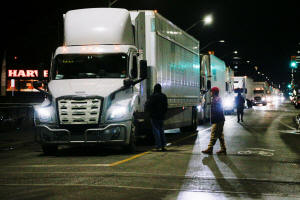As U.S.-Canada border closures risk trade, more govt action is likely
 Send a link to a friend
Send a link to a friend
 [February 10, 2022]
By Ismail Shakil [February 10, 2022]
By Ismail Shakil
(Reuters) - The business impact from
U.S.-Canada border closures is bringing fresh urgency to Canadian
authorities' efforts to quell the two-week-old protests against the
government's pandemic measures, even as the national capital Ottawa sees
early signs of a return to normalcy.
The protests started as a "Freedom Convoy" occupying downtown Ottawa,
opposing a vaccinate-or-quarantine mandate for cross-border truckers
mirrored by the U.S. government. But they have also aired grievances
about a carbon tax and other legislation, and recently spread to border
crossings, including the Ambassador Bridge, a key supply route for
Detroit's carmakers and agricultural products, drawing the attention of
U.S. and Canadian officials.
White House spokesperson Jen Psaki said on Wednesday "it's important for
everyone in Canada and the United States to understand what the impact
of this blockage is - potential impact - on workers, on the supply
chain, and that is where we're most focused."
The bridge closure has caused a shortage of parts at carmaker Stellantis'
assembly plant in Windsor, Ontario. Production has also been affected at
Ford Motor Co.

Police in Ottawa are promising stricter action to end the protests that
occupied the main street in downtown, home to main government buildings,
the parliament house and Prime Minister Justin Trudeau's residence.
Ottawa police on Wednesday laid out threats, ranging from arrests
without warrants to seizure of vehicles, to truck drivers gridlocking
the city's core. Despite their warnings to enforce existing laws for
days now, only 23 arrests have been made.
[to top of second column]
|

Trucks are backed up after protestors shut down the last entrance to
the Ambassador Bridge, which connects Detroit and Windsor, as the
protest against the coronavirus disease (COVID-19) vaccine mandates
continues, in Windsor, Ontario, Canada February 9, 2022.
REUTERS/Carlos Osorio
 "The unlawful act of blocking
streets in the downtown core is resulting in people being denied the
lawful use, enjoyment and operation of their property," police said.
Canadian federal ministers have called the blockade illegal and
asked protesters to return home.
"Those participating in the convoy are hurting Canadians. They pose
serious dangers for the economy and they are breaking the law,"
Public Safety Minister Marco Mendicino told reporters on Wednesday.
Trudeau has stood firm despite some of his own party members
criticizing the government's strict rules to curb the virus.
Canadians have largely followed government health measures, with
nearly 79% of the eligible population inoculated with two doses of a
COVID-19 vaccine. A recent poll found 62% of Canadians surveyed
oppose the "Freedom Convoy".
Some provinces, including the two most populous provinces of Ontario
and Quebec, have started lifting their COVID-19 restrictions to
combat the highly transmissible Omicron variant that emerged late
last year.
(Reporting Ismail Shakil in Bengarulu; Editing by Richard Chang)
[© 2022 Thomson Reuters. All rights
reserved.]
This material may not be published,
broadcast, rewritten or redistributed.
Thompson Reuters is solely responsible for this content. |